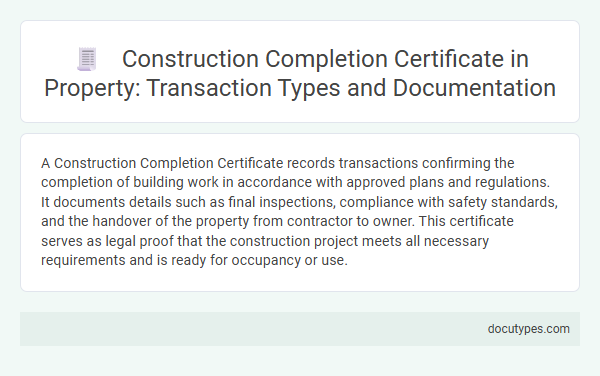A Construction Completion Certificate records transactions confirming the completion of building work in accordance with approved plans and regulations. It documents details such as final inspections, compliance with safety standards, and the handover of the property from contractor to owner. This certificate serves as legal proof that the construction project meets all necessary requirements and is ready for occupancy or use.
Introduction to Construction Completion Certificates
Construction Completion Certificates play a crucial role in the property development process by officially confirming that a building project has been completed according to approved plans and regulations. These certificates ensure the safety, legality, and structural integrity of the property before it is occupied or sold.
- Structural Compliance - Verifies that the construction meets all engineering and design specifications.
- Regulatory Approvals - Confirms adherence to local building codes and zoning laws.
- Final Inspection Results - Records the outcomes of inspections conducted by authorized officials to ensure safety standards.
Your possession of a Construction Completion Certificate signifies that the property is ready for legal occupancy or transfer, protecting your investment and interests.
Importance of Completion Certificates in Property Transactions
A Construction Completion Certificate records critical transactions such as the final inspection approval, compliance with building regulations, and verification of completed work according to the approved plans. This certificate serves as an official confirmation that the property meets safety and quality standards, ensuring legal occupancy. You should prioritize obtaining this document to safeguard your property investment and facilitate smooth ownership transfers.
Types of Property Transactions Requiring Completion Certificates
Construction completion certificates document various property transactions confirming that building works meet approved standards. These transactions primarily include new constructions, major renovations, and property extensions.
Transactions requiring construction completion certificates often involve residential homes, commercial buildings, and mixed-use developments. The certificate verifies compliance with local building codes, ensuring safety and legality. It is essential for sales, leasing, and mortgage approvals in the property market.
Legal Framework Governing Completion Certificates
A Construction Completion Certificate records key transactions related to the finalization of a property build under legal statutes. It confirms compliance with construction regulations and authorizes occupancy.
- Ownership Transfer - The certificate documents the official handover of the property from the builder to the owner as per legal agreements.
- Regulatory Compliance - It verifies that the construction adheres to zoning laws, building codes, and safety standards mandated by municipal authorities.
- Occupancy Rights - The certificate grants You the legal right to occupy and use the constructed property following inspection and approval.
Documentation Required for Obtaining a Completion Certificate
| Transaction Type | Documentation Required | Description |
|---|---|---|
| Final Inspection Approval | Inspection Reports, Compliance Certificates | Proof that the construction meets all building codes and safety standards, verified by authorized inspectors. |
| Structural Completion | Engineering Certificates, Structural Plans | Verification that the structural work is completed according to approved architectural and engineering designs. |
| Utility Connections | Water, Electricity, Gas Connection Certificates | Official documents confirming that essential utilities are installed and operational. |
| Occupancy Compliance | Occupancy Permits, Zoning Clearances | Authorization that the property is suitable and approved for occupation under local zoning laws. |
| Environmental Clearances | Environmental Impact Assessments, Waste Disposal Certificates | Evidence that the construction activities comply with environmental regulations and sustainability standards. |
| Legal Ownership Documentation | Title Deeds, Land Ownership Proofs | Confirmation of ownership and the legal right to construct on the specified property. |
| Contractor Certification | Contractor's Completion Report, Insurance Documents | Documentation from the contractor asserting that the project scope has been fully completed and insured. |
Step-by-Step Procedure for Application
A Construction Completion Certificate (CCC) records various types of transactions crucial for property verification and legal compliance. It documents the completion of construction work, ensuring the structure meets approved plans and safety standards.
The application process involves submitting detailed building plans and structural details to the local municipal authority. Inspectors verify the construction against approved permits before issuing the certificate.
Applicants must provide ownership proof, approved permits, and compliance reports with environmental and fire safety regulations. These documents confirm the property is ready for occupancy and use according to legal standards.
The municipal authority schedules a site inspection to assess construction quality and adherence to regulations. Once approved, the Construction Completion Certificate is formally issued, enabling the owner to proceed with property registration or occupancy.
Common Challenges in Completion Certificate Issuance
A Construction Completion Certificate records key transactions such as final inspections, compliance verifications, and approvals related to structural integrity and safety standards. It also includes documentation of completed works adhering to the approved building plans and regulatory requirements.
Common challenges in issuing a Completion Certificate involve delays due to incomplete documentation and discrepancies in inspection reports. You may encounter difficulties if local authorities require additional compliance checks or if there are unresolved defects that affect certification timelines.
Impact of Completion Certificates on Property Value and Sale
Construction Completion Certificates record key transactions such as final inspections, compliance verifications, and approvals confirming that a property meets all building codes and safety standards. These certificates impact property value by assuring buyers of the building's structural integrity and legal compliance, often increasing market confidence. Properties with Completion Certificates typically experience faster sales and higher sale prices due to reduced risk and enhanced buyer trust.
Verification and Authentication of Certificates
What types of transactions are recorded in a Construction Completion Certificate? These certificates document key verifications that confirm a building complies with approved plans and local regulations. You receive authentication ensuring the construction meets safety and quality standards before occupancy.
What Types of Transactions Are Recorded in a Construction Completion Certificate? Infographic

